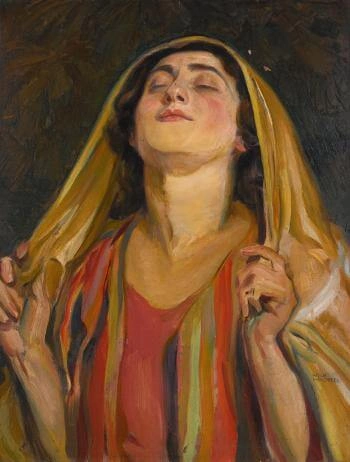1
ιδων δε τους οχλους ανεβη εις το ορος και καθισαντος αυτου προσηλθον αυτω οι μαθηται αυτου
2
και ανοιξας το στομα αυτου εδιδασκεν αυτους λεγων
3
μακαριοι οι πτωχοι τω πνευματι οτι αυτων εστιν η βασιλεια των ουρανων
4
μακαριοι οι πενθουντες οτι αυτοι παρακληθησονται
5
μακαριοι οι πραεις οτι αυτοι κληρονομησουσιν την γην
6
μακαριοι οι πεινωντες και διψωντες την δικαιοσυνην οτι αυτοι χορτασθησονται
7
μακαριοι οι ελεημονες οτι αυτοι ελεηθησονται
8
μακαριοι οι καθαροι τη καρδια οτι αυτοι τον θεον οψονται
9
μακαριοι οι ειρηνοποιοι οτι αυτοι υιοι θεου κληθησονται
10
μακαριοι οι δεδιωγμενοι ενεκεν δικαιοσυνης οτι αυτων εστιν η βασιλεια των ουρανων
11
μακαριοι εστε οταν ονειδισωσιν υμας και διωξωσιν και ειπωσιν παν πονηρον ρημα καθ υμων ψευδομενοι ενεκεν εμου
12
χαιρετε και αγαλλιασθε οτι ο μισθος υμων πολυς εν τοις ουρανοις ουτως γαρ εδιωξαν τους προφητας τους προ υμων
13
υμεις εστε το αλας της γης εαν δε το αλας μωρανθη εν τινι αλισθησεται εις ουδεν ισχυει ετι ει μη βληθηναι εξω και καταπατεισθαι υπο των ανθρωπων
14
υμεις εστε το φως του κοσμου ου δυναται πολις κρυβηναι επανω ορους κειμενη
15
ουδε καιουσιν λυχνον και τιθεασιν αυτον υπο τον μοδιον αλλ επι την λυχνιαν και λαμπει πασιν τοις εν τη οικια
16
ουτως λαμψατω το φως υμων εμπροσθεν των ανθρωπων οπως ιδωσιν υμων τα καλα εργα και δοξασωσιν τον πατερα υμων τον εν τοις ουρανοις
17
μη νομισητε οτι ηλθον καταλυσαι τον νομον η τους προφητας ουκ ηλθον καταλυσαι αλλα πληρωσαι
18
αμην γαρ λεγω υμιν εως αν παρελθη ο ουρανος και η γη ιωτα εν η μια κεραια ου μη παρελθη απο του νομου εως αν παντα γενηται
19
ος εαν ουν λυση μιαν των εντολων τουτων των ελαχιστων και διδαξη ουτως τους ανθρωπους ελαχιστος κληθησεται εν τη βασιλεια των ουρανων ος δ αν ποιηση και διδαξη ουτος μεγας κληθησεται εν τη βασιλεια των ουρανων
20
λεγω γαρ υμιν οτι εαν μη περισσευση η δικαιοσυνη υμων πλειον των γραμματεων και φαρισαιων ου μη εισελθητε εις την βασιλειαν των ουρανων
21
ηκουσατε οτι ερρεθη τοις αρχαιοις ου φονευσεις ος δ αν φονευση ενοχος εσται τη κρισει
22
εγω δε λεγω υμιν οτι πας ο οργιζομενος τω αδελφω αυτου εικη ενοχος εσται τη κρισει ος δ αν ειπη τω αδελφω αυτου ρακα ενοχος εσται τω συνεδριω ος δ αν ειπη μωρε ενοχος εσται εις την γεενναν του πυρος
23
εαν ουν προσφερης το δωρον σου επι το θυσιαστηριον και εκει μνησθης οτι ο αδελφος σου εχει τι κατα σου
24
αφες εκει το δωρον σου εμπροσθεν του θυσιαστηριου και υπαγε πρωτον διαλλαγηθι τω αδελφω σου και τοτε ελθων προσφερε το δωρον σου
25
ισθι ευνοων τω αντιδικω σου ταχυ εως οτου ει εν τη οδω μετ αυτου μηποτε σε παραδω ο αντιδικος τω κριτη και ο κριτης σε παραδω τω υπηρετη και εις φυλακην βληθηση
26
αμην λεγω σοι ου μη εξελθης εκειθεν εως αν αποδως τον εσχατον κοδραντην
27
ηκουσατε οτι ερρεθη ου μοιχευσεις
28
εγω δε λεγω υμιν οτι πας ο βλεπων γυναικα προς το επιθυμησαι αυτην ηδη εμοιχευσεν αυτην εν τη καρδια αυτου
29
ει δε ο οφθαλμος σου ο δεξιος σκανδαλιζει σε εξελε αυτον και βαλε απο σου συμφερει γαρ σοι ινα αποληται εν των μελων σου και μη ολον το σωμα σου βληθη εις γεενναν
30
και ει η δεξια σου χειρ σκανδαλιζει σε εκκοψον αυτην και βαλε απο σου συμφερει γαρ σοι ινα αποληται εν των μελων σου και μη ολον το σωμα σου βληθη εις γεενναν
31
ερρεθη δε οτι ος αν απολυση την γυναικα αυτου δοτω αυτη αποστασιον
32
εγω δε λεγω υμιν οτι ος αν απολυση την γυναικα αυτου παρεκτος λογου πορνειας ποιει αυτην μοιχασθαι και ος εαν απολελυμενην γαμηση μοιχαται
33
παλιν ηκουσατε οτι ερρεθη τοις αρχαιοις ουκ επιορκησεις αποδωσεις δε τω κυριω τους ορκους σου
34
εγω δε λεγω υμιν μη ομοσαι ολως μητε εν τω ουρανω οτι θρονος εστιν του θεου
35
μητε εν τη γη οτι υποποδιον εστιν των ποδων αυτου μητε εις ιεροσολυμα οτι πολις εστιν του μεγαλου βασιλεως
36
μητε εν τη κεφαλη σου ομοσης οτι ου δυνασαι μιαν τριχα λευκην η μελαιναν ποιησαι
37
εστω δε ο λογος υμων ναι ναι ου ου το δε περισσον τουτων εκ του πονηρου εστιν
38
ηκουσατε οτι ερρεθη οφθαλμον αντι οφθαλμου και οδοντα αντι οδοντος
39
εγω δε λεγω υμιν μη αντιστηναι τω πονηρω αλλ οστις σε ραπισει επι την δεξιαν [σου] σιαγονα στρεψον αυτω και την αλλην
40
και τω θελοντι σοι κριθηναι και τον χιτωνα σου λαβειν αφες αυτω και το ιματιον
41
και οστις σε αγγαρευσει μιλιον εν υπαγε μετ αυτου δυο
42
τω αιτουντι σε διδου και τον θελοντα απο σου δανεισασθαι μη αποστραφης
43
ηκουσατε οτι ερρεθη αγαπησεις τον πλησιον σου και μισησεις τον εχθρον σου
44
εγω δε λεγω υμιν αγαπατε τους εχθρους υμων ευλογειτε τους καταρωμενους υμας καλως ποιειτε τοις μισουσιν υμας και προσευχεσθε υπερ των επηρεαζοντων υμας και διωκοντων υμας
45
οπως γενησθε υιοι του πατρος υμων του εν [τοις] ουρανοις οτι τον ηλιον αυτου ανατελλει επι πονηρους και αγαθους και βρεχει επι δικαιους και αδικους
46
εαν γαρ αγαπησητε τους αγαπωντας υμας τινα μισθον εχετε ουχι και οι τελωναι το αυτο ποιουσιν
47
και εαν ασπασησθε τους φιλους υμων μονον τι περισσον ποιειτε ουχι και οι τελωναι ουτως ποιουσιν
48
εσεσθε ουν υμεις τελειοι ωσπερ ο πατηρ υμων ο εν τοις ουρανοις τελειος εστιν







